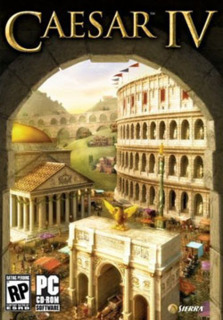Good but not bad By kamesh
The trade aspect is one of the ways in Caesar IV that your city can tie into the Roman world as a whole. Instead of merely being an isolated satellite, you can open up trade ties with other cities. Ships will come in to pick up and deliver goods, which can thus fuel your economic growth. On a more pressing note, Rome will often make demands of you to deliver food, goods, or money. Fail to keep up with Rome's demands, and your imperial rating will plummet, making it harder to win certain scenarios, as well as putting you in danger of being replaced by Rome for your incompetence. In that case, you can try placating the Senate with gifts. Of course, the easier method is simply to keep up with Rome's demands, and that means building a strong economy.
Still, the economy can be finicky to manage, as bottlenecks can erupt in several places. Having no spare warehouse space often means that products sit in the factories, waiting to be distributed, and it's almost impossible to unload unwanted goods to make room, short of razing the warehouse and building a new one. This can be avoided with a lot of micromanagement of the economy, as you can tell warehouses to only stock so much of certain goods, but there ought to be a simpler way of dealing with this, as well, like dumping products into someone else's hands.
Then there's the entire concept of building legions and defenses and defending the city from the occasional barbarian horde. Simply put, constructing walls around your city is a pain thanks to the strict building restrictions that often have you tear down and rebuild parts of your city to squeeze in walls. With that said, it's a bit easier to simply build a fort and recruit a legion to kill the pesky barbarians whenever they appear.
Caesar IV also manages to incorporate an online element into a traditionally single-player genre. You won't be building cities alongside other players in a cooperative game, but Caesar IV does let you challenge players in a couple of ways. Caesar's Challenge is for the veteran players who want to determine who the best is. These are basically a series of challenges that require you to create a city to generate the most money, highest scoring city, and so on. Your performance on each scenario is ranked, with the top performer getting all the glory. If you're looking for a less competitive challenge, the persistent online Empire allows you to build and upload cities. The more cities that you build, the greater your overall Empire. You can then compare your cities to those of other players on the official Caesar IV site. Visually, Caesar IV has a solid look to it, though the graphics border a bit more on workmanlike than on sheer beauty. Still, from a distance, it's easy to appreciate the sense of having a virtual city come to life on your screen. There are some good-looking lighting and weather effects, as well as reflective water, though dynamic shadows can cripple the overall performance. Disabling shadows means the graphics lose a bit of their luster, but the game doesn't chug whenever you shift the camera angle. However, two bigger issues are the lengthy long load times and the stability problems, as the game froze up on us quite a bit, making the aforementioned load times even more tedious. There's a musical score that blends in nicely in the background during the many hours of gameplay, and you do get verbal feedback to how you're doing whenever you click on a citizen.

